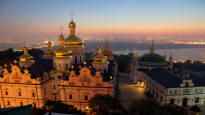KIEV This week, the Security Service of Ukraine conducted a search of the famous cave monastery in Kyiv. The place is a world heritage site.
Why is the monastery of interest to the Ukrainian authorities and what has been found in the searches?
We listed the answers to the five most important questions about the situation of the monastery.
1. What is the Kiev Cave Monastery known for?
The Pechersk Lavra, a cave monastery in the center of Kyiv, is one of the most famous sights of the Ukrainian capital. It was founded in 1051. UNESCO added the monastery to the list of World Heritage Sites in 1994.
The caves of the monastery contain relics of Orthodox saints. Part of the monastery functions as a museum, the rest belongs administratively to the Moscow Patriarchate.
There are currently several Orthodox churches operating in Ukraine. The two largest of them are the Church belonging to the Moscow Patriarchate and the Ukrainian Orthodox Church, whose autocephalous or independent status was recognized in 2019 by the Patriarchate of Constantinople.
Other churches have tried to take over the Pechersk Lavra, but without success.
Luolauostari and its management have been the object of criticism several times in Ukraine. The monks have been alleged to be proclaiming Russian imperialist rhetoric and spreading Soviet-era historical myths.
Also, it has not pleased the Ukrainians that guided tours of the cave monastery are organized mainly in Russian.
Since 2014, the director of the Lavra has been a metropolitan Pavlo. He is ironically called Pasha Mercedes in Ukraine, because he likes expensive cars like many Russian priests.
Pavlo is known for his pro-Russian stances. Among other things, he has accused Ukraine of starting the war in Donbas, demanded the unification of Ukraine and Russia, and claimed that Crimea was never Ukrainian.
After February, Pavlo did not condemn the Russian attack. Instead, he said, the Ukrainians had not heeded the warnings, so now they are reaping the rewards.
2. Why has the SBU of Ukraine searched the monastery?
On November 13, information spread in the Ukrainian media that Russia is mentioned in prayers in the monastery. In one line, it was sung like this: “The ringing of the bell is hovering over Russia, Mother Russia is waking up.”
The management of the Lavra moved the page of the priest who performed the service in question and said that Russia had been mentioned by “activists” and that the priest was not aware of the matter.
However, the commotion reached such proportions that the Security Service of Ukraine began to investigate the case. On November 22, the SBU conducted searches in a few church units under the Moscow Patriarchate, one of which was the Kiev Cave Monastery.
According to the SBU, the raid is part of an anti-terrorist operation aimed at checking whether the monastery’s premises are being used as a hiding place for sabotage groups and weapons, and whether Russian propaganda is being spread there.
3. What has been found in the monastery during the searches?
The Security Service of Ukraine says it inspected 350 buildings and 850 people at three addresses.
According to SBU (you switch to another service) persons without papers, pro-Russian literature and large sums of money in hryvnias, dollars and rubles have been found in the church premises.
In addition, according to the SBU, a 32-year-old Ukrainian was staying in the Kiev cave monastery, who may be involved in the activities of a pro-Russian news agency in Ukraine.
4. Why wasn’t the Moscow Patriarchate banned after the Russian invasion?
In May, the Ukrainian Orthodox Church decided to break away from the Moscow Patriarchate, while still maintaining spiritual connections with Moscow.
In practice, the decision has not been implemented, as it requires the blessing of the Moscow Patriarchate.
After the Russian invasion, a few hundred congregations that functioned under Moscow have moved under the independent Orthodox Church. Some of the other congregations have stopped mentioning the Patriarch of Moscow Cyril in their liturgies.
In March, a few members of parliament made a bill to ban the activities of the Moscow Patriarchate in Ukraine. However, the proposal did not get off the ground due to opposition from the presidential office. According to the president, the ban would lead to the division of the Ukrainian people.
This week, the Ukrainian parliament was again given presentation (you switch to another service)which would ban all ecclesiastical communities that are in any way affiliated with the Russian Orthodox Church.
A ban would have popular support. Recently published opinion survey (you switch to another service) according to 48.7 percent of Ukrainians have a negative attitude towards the activities of the Ukrainian Orthodox Church of the Moscow Patriarchate, and 61.9 percent of respondents would disapprove of its activities.
5. How has Russia reacted to the cave monastery situation?
Spokesperson for the Russian Foreign Ministry Maria Zakharova said that it is a “godless bacchanal for which there can be no reasons or explanations”.
Kremlin press secretary Dmitry Peskov called the SBU searches “the next step in Ukraine’s war against the Russian Orthodox Church.”
The Ukrainian Orthodox Church responded to this by stating that it has as much to do with Russian Orthodoxy as Kherson has to do with Russia.
Updated at 17:08: corrected list of the largest Orthodox churches in Ukraine
